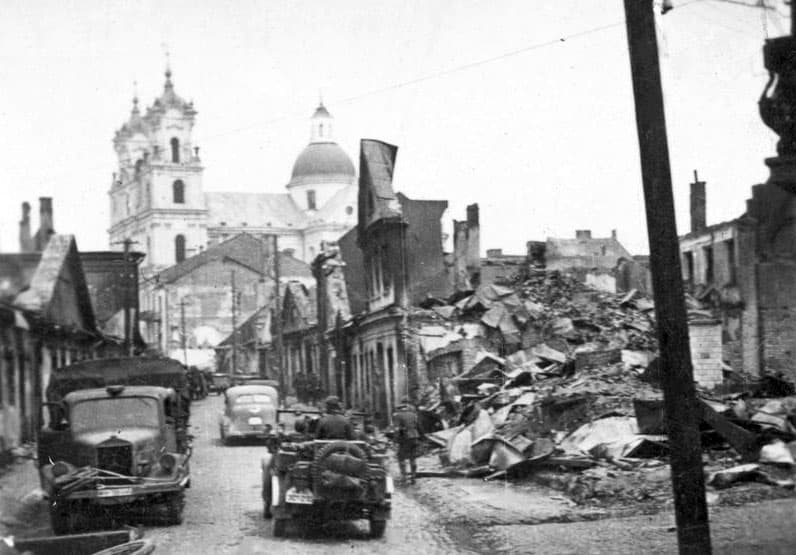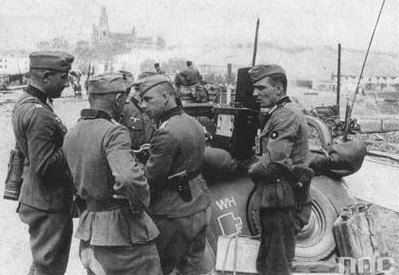
The impression made that day on the mind of an 8-year old boy and the associated images are getting even sharper as time progresses.

At dawn, on the first day of the month in 1939, Germany attacked Poland in a number of air raids on specific towns and strategic targets throughout the country. We lived in a civilian compound at the edge of a military base in Grodno where my father was an artillery officer in charge of an anti-aircraft unit. German aircraft from East Prussia, only minutes away, appeared over the town bombing the bridges on the river Niemen and the military bases. We were among the first targets of that raid.
It was the sound of the air raid siren on top of our building that jerked me out of sleep. It shattered the stillness of the early dawn, a violent and sudden reminder to take cover. Actually we were used to it because we heard that siren on several prior occasions when they tested the system. But this time it was different. Other, more distant sirens joined in one by one. For several minutes they sounded like a monstrous, expanding orchestra chorus wailing out of sync and scattered all over town…
Then, unexpectedly, there was a blinding flash… I felt a blow of air in the chest, and heard the thunder of an explosion.
The sound of shattered glass and bricks raining on cobblestones in the street below was then followed by a sudden silence…
Only after a while the drone of engines of the attacking bombers registered in my consciousness. Anti-aircraft guns around the military compound opened up. Their staccato salvoes sounded like some big dogs barking in the distance. More thundering explosions followed further and further away.
Germans taking over the town of Grodno.
Then my heart started beating again.
Someone switched on the radio: “Attention, attention, it’s coming. Ko, Ma, Three. Attention, attention…” This message repeated over and over again.
Father ran along the corridor of our apartment. He tried to strap on the gun holster to the leather belt of his uniform. He shouted to Mother, “Take the children below. Under the stairs in the lobby. I have to report.”
“Dress yourself quickly,” Mother said to me. She asked the maid to dress my younger brother while she took care of the two-week old baby.
“The windows, “somebody screamed. “Close the windows. It’s gas. Poison gas.”
“The windows are broken,” another voice answered. “All the windows are broken. Most of the glass is gone.”“It’s gas. I tell you it’s gas.”
Mother moved. She told the cook to get a jug of water and find some linen napkins. In the kitchen she grabbed a bottle of vinegar.
“Quickly, the water,“ she said, “in case of gas…” she poured the vinegar into the water and wetted the cloth. Then she slapped the moist napkins over the mouths of the baby in her arms and my younger brother. She gave one to me. “Breathe through this…breathe, my God…”
The four year-old boy began to cry irritated by the wet, sour and cold napkin on his face. Mother herded us out of the apartment. Our girl carried the jug with vinegar water and additional napkins. By the time we got down there were several people already huddled under the concrete staircase of the lobby. “It’s safe here, it’s good,” they told each other. I do not remember how long we stayed there but several events made an impression on me at that time.
Suddenly a doorway was flung open. Yellow dust hung in the air outside. It began to mix with thick, black smoke from roaring flames of a burning building across the street. A man appeared at the doorway.
“Close the door,” someone shouted. “It’s gas. I know it’s gas.”
“Close the door! Close the door!” yelled the crowd. “It’s gas. Close it. There are women and children here.”
The man ignored the shouts and motioned to others outside. Several people came in from the street.
“It’s safe here,” they said. “They have water. That’s good.”
“You don’t live here,” shouted the people under the staircase. “Go away. Go to your own building.”
“We are from the clinic across the street,” they answered. “It’s been hit. We are patients. Some of us are wounded and burned. There are also dead.”
“Yes and that bomb was supposed to hit your building,” another man added. “You are a military target. We were only a civilian hospital. “
Mother held a wet napkin against the face of the baby and my brother who wanted to wriggle away from her. People looked at them and tried to understand.
“I thought it was gas, “she explained. “I am a pharmacist. Vinegar solution is a filter.”
An officer in uniform came into the lobby from the garden behind the apartment building that formed part of the military base. He overheard the conversation.
“No,” he said. “The flag on our headquarters is red. For gas it’s green. There is no danger. By the way, the Germans missed all the military targets. The bombs mostly fell into the nearby streets and fields. But they will be back. Their airfields in East Prussia are only twenty minutes away. You better evacuate these buildings as soon as you can.”
The doorway to the street flung open again. Two men staggered in covered with dust. One, frightened out of his wits or in shock, whined away all the time at his companion.
“We shall die, we shall die, they’re going to kill us,” he repeated over and over again.
“Don’t be silly,” the other answered. “You have nothing to worry about. The Germans are only bombing the Jews.”
I took the wet napkin away from my face and looked at the man. Acrid smell and dusty air filled my nose and mouth. I felt a sour taste and grit between my teeth. The stranger noticed my stare and moved closer.
“You have nothing to worry about, my boy,” he repeated and pointed his finger at my big blue eyes. He gave me a pat on the shoulder. Mother looked up from under the concrete staircase. She gave the stranger a fleeting smile and went back to comfort the baby in her arms.
I could not understand what it was all about. It seemed that the people were now calmer than before but there was something at the back of my mind that bothered me.
“How will the German pilots high above know who is who?” I thought. “Perhaps it’s one of those secrets that grown-ups don’t want the children to know.”
It really did not matter. Things were happening. We did not have to eat the dreaded oatmeal for breakfast. That was good. No school, of course. No need to play in the sand box with other children of the compound. That was boring. There was an air of adventure in the air. That was exciting. But the most curious part of it all was that I was not afraid. On the contrary. Life was becoming more than routine. It looked promising of something not quite tangible at the time but definitely interesting.
When the “all clear” sounded most people in the lobby rushed back to their apartments. Others went out into the street. In all it felt like a big disappointment.
We walked back to our apartment where the radio continued with the same message. “Attention, attention, it’s coming….”
It was September 1, 1939. World War II had just begun. (Total words 1278)
Syndicated by 21st Century Research
Bohdan Szuprowicz < maska5@comcast.net>
Other columns and articles by Bohdan O. Szuprowicz available from 21st Century Research:
A Nuclear Republic of Chiapas, A Cold War Affair, The Sweet Taste of Revenge, Secret Reports of a Spy from Outer Space, The Standby, The Rape of Monsignor Minet, Binki – How the life of a dog was saved, Who’s Next for Paradise? – My Suicides, The Doublecross Committee, A Medieval Tale of Lust (Adult Language in Verse), Print-on-Demand Publishing for All, So Why Isn’t Anyone Buying My Book?

